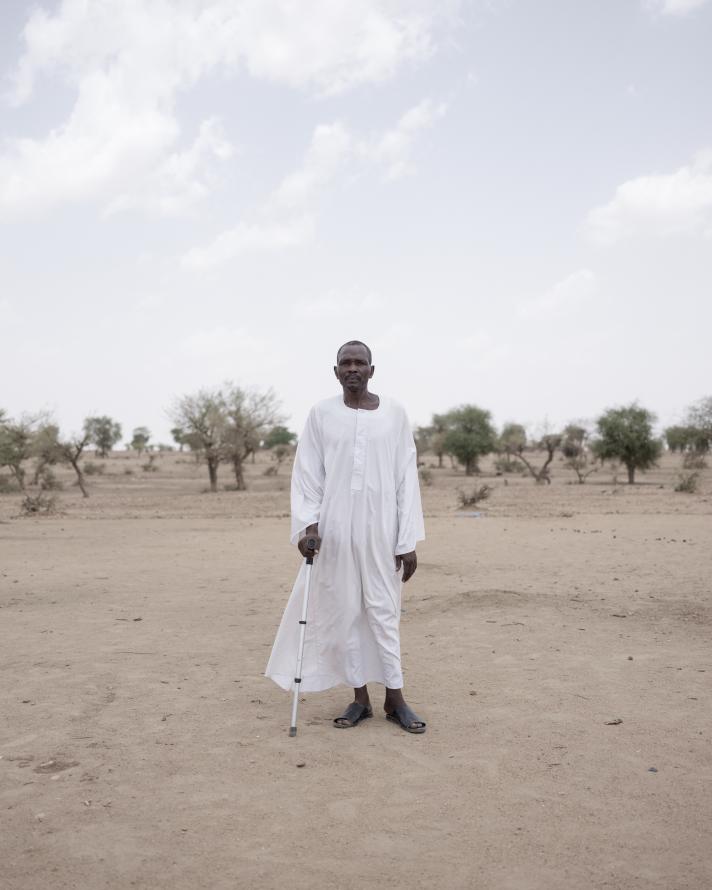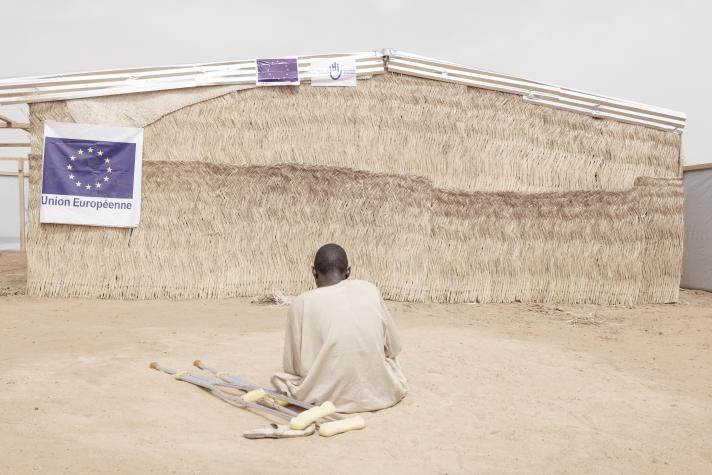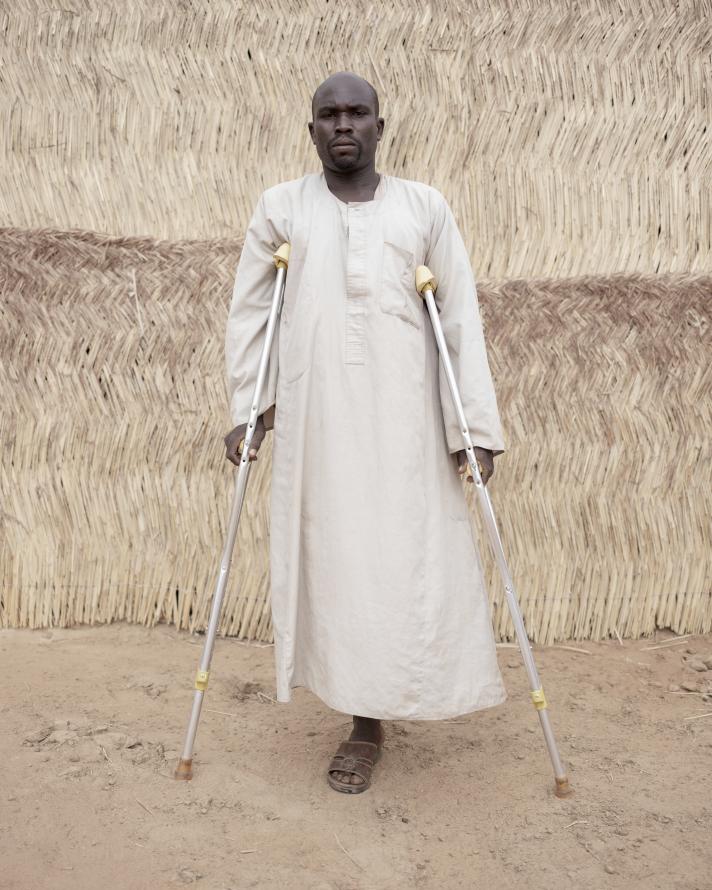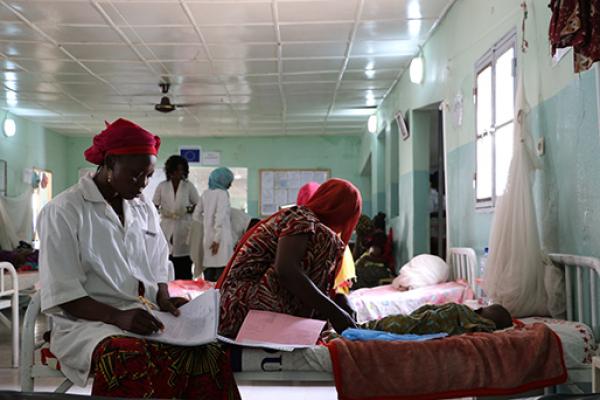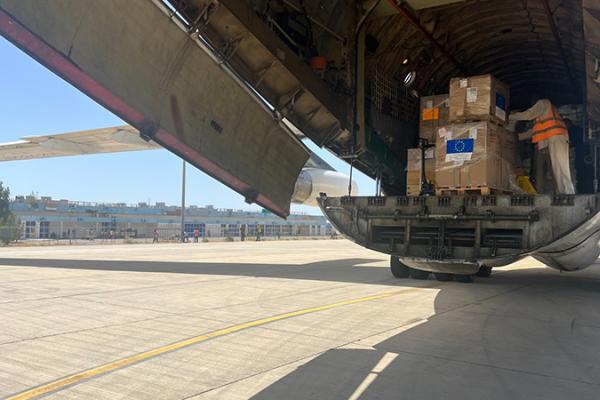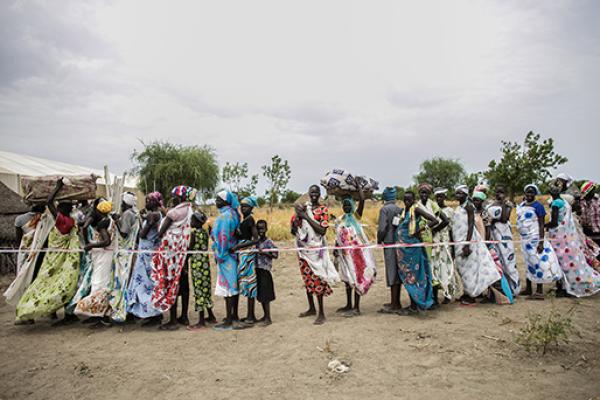Since the outbreak of the conflict in Sudan in 2023, the hostilities have pushed over a million displaced people – including Sudanese refugees and Chadian returnees – into neighbouring Chad. About 50,000 have been relocated to Aboutengue, one of the 5 established refugee camps that have been opened in eastern Chad. Among these displaced individuals is Alsadik Isshak Arbab, a 45-year-old man, who fled Sudan amidst violence and is now reliant on a cane to be able to walk. Unfortunately, Alsadik’s experience is not unique: many refugees carry physical injuries from Sudan, compounding the difficulties of adapting to their new lives in a foreign land.
Aboubakar Azien Ahmat, 65, was able to reach Chad together with his wife, Hadja Ismail Ahmal and their 8-year-old daughter Naba. Despite finding a safe refuge for his family, his physical injuries together with the trauma of displacement weigh heavily on him, further complicating the adjustment to his new life in the camp.
It is often the case that those most in need of trauma care are also the ones most struggling to access it. In many low- and middle-income countries, over 50% of individuals in need lack rehabilitation services. To address this and provide refugees with disabilities with the help they require, EU partner Humanity & Inclusion (HI) has established a rehabilitation centre within Aboutengue camp, where Aboubakar and others receive vital physical therapy to support their recovery. Rehabilitation and trauma care are fundamental in emergencies and conflict situations: they save lives, reduce morbidity and mitigate disabilities. Assistive devices, prosthetics, orthotics and physiotherapy all play a role in speeding up recovery.
When we arrive to the HI rehabilitation centre, Zara Abakar Yakhoub, a 27-year-old woman is sitting outside with one of the counsellors. She was forced to flee from El Geneina, Sudan, when her house was raided. First her father and then her husband were killed while trying to protect her from sexual violence. Traumatised, she would not move and would not respond to any order given by the militias, and they therefore took vengeance by killing her 6-month-old baby as well. She eventually managed to escape and witnessed many other atrocities: ‘I recall the awful images of women being taken away and raped in the streets of my village’, she says in a faint voice. Zara’s journey across a landscape of devastation, including losing a leg in an explosion, highlights the severe physical, mental and emotional trauma borne by many refugees.
The struggle to accept what she had to endure adds to the vulnerability and the difficulty to meet her basic needs as a refugee. ‘I wish that other persons with disabilities in the camp and I would be better integrated, and able to work in the camp’, she tells us. Previously a seller in her hometown, her economic prospects now appear bleak.
‘In fact, rehabilitation is not only a medical issue. It also has a socio-economic and protection concern for families, communities and society overall.’ says Chiara Ciminello, EU Humanitarian Aid Expert for protection and gender. ‘War-related disabilities, along with the loss of assistive devices and the breakdown of support systems for individuals with pre-existing impairments, have serious protection consequences. These factors can result in a loss of livelihood and a decline in mental well-being, while also increasing the risk of neglect, marginalisation, and barriers to accessing vital services and humanitarian assistance.’
To address these challenges, the EU funds projects that follow a needs-based approach, placing the individual holistically at the centre of the intervention. This approach integrates rehabilitation into primary and secondary healthcare and links it up with social services and mental health and psychosocial support (MHPSS), acknowledging the critical role of both in the process of recovery for the individual, as well as for the community.
Zara comes regularly to the EU-funded rehabilitation centre run by Humanity & Inclusion in the camp. Here, she says, she feels able to help others facing difficulties and to share her experience and knowledge with them. When we met her, together with one of the counsellors, they recalled her path coping with the immense trauma. For many months, she was not able to talk about what had happened to her family and she would have several psychological crises preventing her from sleeping, eating or drinking. ‘I am proud to be able to share my story now’, she says, while showing us weaving techniques. The counsellor explains to us that the pieces they crochet or weave are transitional objects, serving a double purpose as a therapeutic tool and potential livelihood skills.
In this supportive environment, 62 women gather twice a week for group activities that foster community and resilience, creating a support network. During the other days, the EU-funded centre offers individual consultations for people that are not yet ready to talk about sensitive topics in a group format.
Here in Aboutengue, refugees in need are also provided with walkers or fitted with prosthetics. In fact, rehabilitation is highly person-centred, meaning that the interventions selected for each individual are targeted to their goals, needs and preferences. Rehabilitation can be provided in different places, such as inpatient or outpatient hospital settings.
In 2024, the EU has allocated €357 million to support humanitarian health projects worldwide. We remain committed to providing assisted rehabilitation care, understanding that the continuity of care and recovery must be both inclusive and adapted to people’s needs. It should also be gradually included through national health systems with a longer-term approach.

